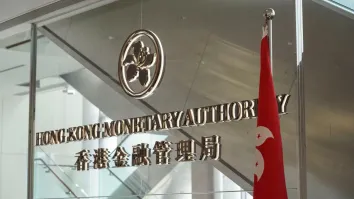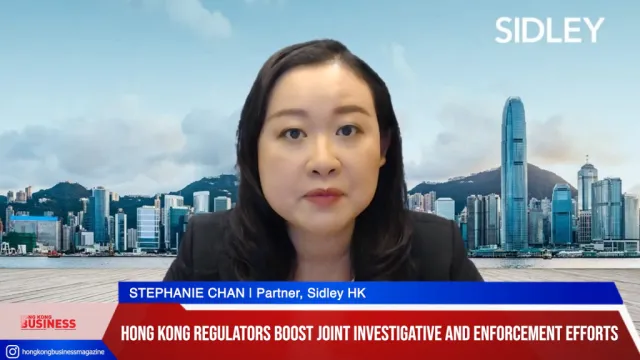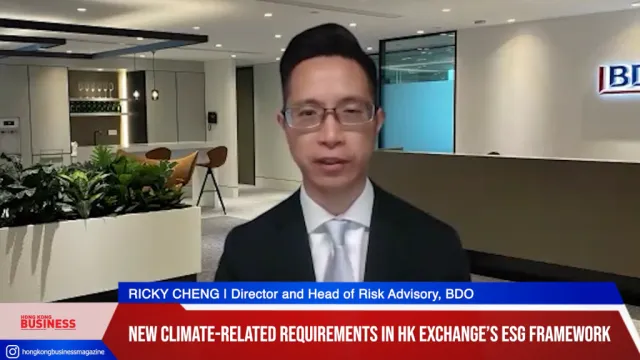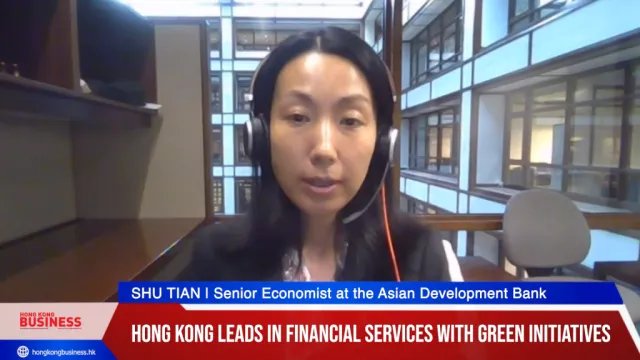
Talent management crucial to effective ESG reporting
Hong Kong has made new GHG emission disclosure policies mandatory.
As regulations like greenhouse gas (GHG) emission reporting come into force, companies typically boost sustainability investments. However, an expert stresses that talent management strategies are equally important in addressing climate risks and opportunities.
BDO Director and Head of Risk Advisory Ricky Cheng said listed companies affected by the Hong Kong Exchange’s (HKEX) mandate on climate-related disclosure must “cultivate professional talents and seek external consultation” to “improve the mechanism of climate-related information disclosure.”
“Building internal expertise through training and capacity-building programs is [an] essential strategy, whilst leveraging external consultants’ expertise could enhance companies’ ESG reporting exercise more effectively,” Cheng told Hong Kong Business.
Changes in business models, products, and service offerings may come alongside the need to address climate risks and opportunities consistent with environmental, social and governance (ESG) goals. But Cheng said companies also need a variety of talents to support these efforts.
Assessing the impact of climate-related risks and opportunities on the business model and value chain is one of the requirements under HKEX’s new requirements.
Also, subject to the phased implementation approach set out by the HKEx and based on the “Comply or explain” basis, companies shall conduct a climate scenario analysis and report on the GHG emissions Scope 3 throughout the value chain.
The new disclosure requirements will come into effect for the financial year beginning on or after 1 January 2025.
Despite the challenges posed by the new requirements, Cheng emphasised that setting up proper mechanisms and policies for climate-related data governance could resolve them, alongside a talent management strategy.
“Companies need to integrate environmental information disclosure requirements into the company’s overall strategic and operational management and establish a sound environmental management system,” Cheng said.
“In general, responding to the demand for climate-related information disclosure requires companies to comprehensively improve their environmental management capabilities to ensure the accuracy and effectiveness of information disclosure,” Cheng added.
Cheng stressed that some companies are improving their capabilities by taking up courses on reporting frameworks such as the Sustainability Accounting Standards Board (SASB), the Task Force on Climate-Related Financial Disclosures (TCFD), and the International Sustainability Standards Board (ISSB).
In response to the Scope 3 reporting requirements, some companies have engaged with their value chain partners to collect data for disclosure purposes.
For companies struggling to gather comprehensive and reliable data on their GHG emissions, energy consumption, and other climate-related metrics from supply chain partners, Cheng advised establishing a supply chain engagement programme.
Such a programme could help a company’s partners to “understand the trend for sustainable supply chain, needs for providing the required information and the related benefits from a commercial point of view such as being recognised by customers as responsible vendors and, in turn, gaining better reputation and competitive advantages.”
Meanwhile, companies that have not started climate scenario analysis should consider using public domain models such as the Intergovernmental Panel on Climate Change (IPCC), Network for Greening the Financial System (NGFS), and International Energy Agency (IEA) to assess outcomes pertinent to their geography and business performance.
“Companies may need to establish knowledge in understanding these models and mapping those potential outcomes with their operational and financial performance,” Cheng told Hong Kong Business.
“Those charged with governance need to fully understand the latest reporting framework and standards, conduct research into peer disclosure references and study pile of materials when making related estimation and forecast.”
Setting up a complete environmental information management system, bolstering climate risk identification and analysis, advancing carbon emission accounting and reduction skills, and enhancing stakeholder communication and disclosure will also help companies respond to the climate-related disclosure requirements, he added.
Although climate-related disclosures are resource-intensive and will require additional staff, specialised training, and investments in advanced data management systems, these efforts could enhance investor engagement and access to capital.
“Disclosure of this information may result in higher ESG rating, allowing access to capital, lower costs, and better valuation,” Cheng said. “This could help build the investors’ confidence on the company's climate resilience and fulfill some of the investors' expectations over the transition plan towards the net zero of companies.”



















 Advertise
Advertise






